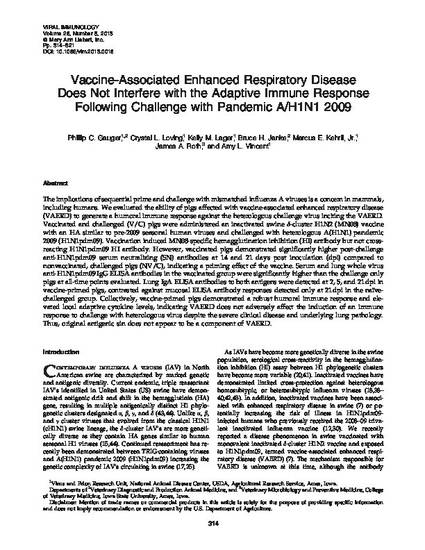
Article
Vaccine-Associated Enhanced Respiratory Disease Does Not Interfere with the Adaptive Immune Response Following Challenge with Pandemic A/H1N1 2009
Viral Immunology
Document Type
Article
Disciplines
Publication Version
Published Version
Publication Date
10-1-2013
DOI
10.1089/vim.2013.0018
Abstract
The implications of sequential prime and challenge with mismatched influenza A viruses is a concern in mammals, including humans. We evaluated the ability of pigs affected with vaccine-associated enhanced respiratory disease (VAERD) to generate a humoral immune response against the heterologous challenge virus inciting the VAERD. Vaccinated and challenged (V/C) pigs were administered an inactivated swine δ-cluster H1N2 (MN08) vaccine with an HA similar to pre-2009 seasonal human viruses and challenged with heterologous A(H1N1) pandemic 2009 (H1N1pdm09). Vaccination induced MN08-specific hemagglutination inhibition (HI) antibody but not cross-reacting H1N1pdm09 HI antibody. However, vaccinated pigs demonstrated significantly higher post-challenge anti-H1N1pdm09 serum neutralizing (SN) antibodies at 14 and 21 days post inoculation (dpi) compared to nonvaccinated, challenged pigs (NV/C), indicating a priming effect of the vaccine. Serum and lung whole virus anti-H1N1pdm09 IgG ELISA antibodies in the vaccinated group were significantly higher than the challenge only pigs at all-time points evaluated. Lung IgA ELISA antibodies to both antigens were detected at 2, 5, and 21 dpi in vaccine-primed pigs, contrasted against mucosal ELISA antibody responses detected only at 21 dpi in the naïve-challenged group. Collectively, vaccine-primed pigs demonstrated a robust humoral immune response and elevated local adaptive cytokine levels, indicating VAERD does not adversely affect the induction of an immune response to challenge with heterologous virus despite the severe clinical disease and underlying lung pathology. Thus, original antigenic sin does not appear to be a component of VAERD.
Rights
Works produced by employees of the U.S. Government as part of their official duties are not copyrighted within the U.S. The content of this document is not copyrighted.
Language
en
File Format
application/pdf
Citation Information
Phillip Charles Gauger, Crystal Lynn Loving, Kelly M. Lager, Bruce H. Janke, et al.. "Vaccine-Associated Enhanced Respiratory Disease Does Not Interfere with the Adaptive Immune Response Following Challenge with Pandemic A/H1N1 2009" Viral Immunology Vol. 26 Iss. 5 (2013) p. 314 - 321 Available at: http://works.bepress.com/james_roth/40/

This article is from Viral Immunology 26 (2013): 314, doi:10.1089/vim.2013.0018.